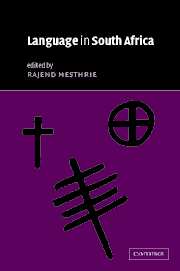Book contents
- Frontmatter
- Contents
- List of maps
- List of contributors
- Acknowledgements
- List of phonetic symbols
- List of abbreviations
- Introduction
- Part I The main language groupings
- Part II Language contact
- Part III Language planning, policy and education
- 22 Language planning and language policy: past, present and future
- 23 Language issues in South African education: an overview
- 24 Recovering multilingualism: recent language-policy developments
- Index
- References
22 - Language planning and language policy: past, present and future
from Part III - Language planning, policy and education
Published online by Cambridge University Press: 22 September 2009
- Frontmatter
- Contents
- List of maps
- List of contributors
- Acknowledgements
- List of phonetic symbols
- List of abbreviations
- Introduction
- Part I The main language groupings
- Part II Language contact
- Part III Language planning, policy and education
- 22 Language planning and language policy: past, present and future
- 23 Language issues in South African education: an overview
- 24 Recovering multilingualism: recent language-policy developments
- Index
- References
Summary
That language planning should serve so many covert goals is not surprising. Language is the fundamental institution of society, not only because it is the first human institution experienced by the individual, but also because all other institutions are built upon its regulatory patterns … To plan language is to plan society.
(Cooper 1989: 182)INTRODUCTION
In 1971, Rubin and Jernudd edited a book entitled Can Language be Planned? That was, and remains, an important question, and one that linguists and policy makers are increasingly confident in answering in the affirmative. As Robert Cooper noted in the quotation above, ‘to plan language is to plan society’ – and the planning of society is, if anything, an increasingly common phenomenon in both the ‘developed’ and ‘developing’ worlds. In fact, the significant question is not whether language can be planned, but rather how and by whom. In this chapter, the nature of language planning as an applied sociolinguistic activity will be explored, with a particular focus on the challenge of linguistic diversity in South Africa, as well as on the ways in which that diversity has been addressed in the past and is likely to be addressed in the years ahead. Further, policy issues in language planning in the South African context, the challenge of ethnicity for language planning, and finally the future of language policy and language planning in South Africa will be discussed.
- Type
- Chapter
- Information
- Language in South Africa , pp. 419 - 433Publisher: Cambridge University PressPrint publication year: 2002
References
- 12
- Cited by



